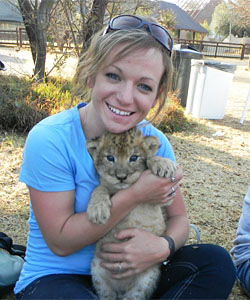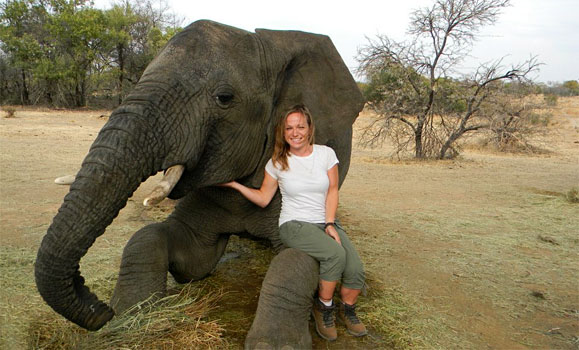When Holly MacNeil ran into a fellow student who told her about her life-changing trip with EcoLife Expeditions, she knew right away that she too wanted to go on a journey of a lifetime.
Last summer, Holly spent three weeks in South Africa working on wildlife conservation efforts, experiencing different places, cultures and going on adventures, all the while earning credits towards her degree in Animal Sciences in the Faculty of Agriculture.
EcoLife Expeditions brings students to South Africa who are interested in conservation, wildlife management and want future careers in veterinary sciences. Holly, who grew up on a hobby farm in Cape Breton, N.S., knew she wanted a career in veterinary medicine, but was unsure of what area within the field she wanted to focus on, and had never travelled further than Boston or New Brunswick.
тАЬI believe that experiences, good or bad, are the best way to find out your strengths, weaknesses and interests," she says. "So trying something completely out of my comfort zone was the best way to figure myself out."
She set her sights on Africa.┬а
Hands-on learning
During the first week of the program, Holly met with a professor from Pretoria University and visited the crowded and impoverished townships of Soweto. With Community Lead Animal Welfare, a non-profit veterinary clinic, she assisted in providing free vaccines, flea and tick treatment, and dewormer to local dogs, and assisted in the selected surgeries for the day.
 She travelled to a big cat farm and played with lion cubs and walked with cheetahs, while learning how the farming of wildlife species has become incredibly important to their survival. A few days were spent tracking on foot, keeping a close eye on signs that would lead to wildlife.
She travelled to a big cat farm and played with lion cubs and walked with cheetahs, while learning how the farming of wildlife species has become incredibly important to their survival. A few days were spent tracking on foot, keeping a close eye on signs that would lead to wildlife.
тАЬIt is incredibly exhilarating and intense when you actually get an up-close look at these magnificent creatures,тАЭ says Holly, тАЬfrom the shear size of the rhino, hippo and giraffe, to the gracefulness of the impala littering the shoreline. It's all very awe-inspiring.тАЭ
Throughout the program, she got to explore importance of wildlife medicine and conservation while gaining hands-on experience. At the Khamai Reptile Center, she performed a necropsy on a boa constrictor (a snake) to help determine cause of death and at the Moholoholo Wildlife Rehabilitation Center she directly learned about the immediate impact of human encroachment on wildlife.
тАЬMany rescues are from snares and traps, set by villagers fearing their own safety. We spent a few days in Mejejane, located in Kruger National Park, where we again went on game walks and witnessed firsthand the devastation that mismanagement of wildlife areas can cause. The barren savannah is littered with dead and broken trees, and there are no more aloe plants or amarula trees within the park, apparently a favourite for elephants.тАЭ
Holly also learned a great deal about the impact of poaching, as rangers and environmental consultants offered first-hand accounts and experiences about the illegal poaching industry. ┬а
An eye opener
The final days of her journey were spent in the picturesque Waterberg Biosphere with wildlife veterinarians, darting buffalo from the back of pickups, trying to round up a stray giraffe and capturing nyala for sale and transport, all making for interesting and labor-intensive days.
тАЬPrior to the program, I worked in small animal clinics, large animal agriculture and even some local wildlife, but nothing even comes close to this,тАЭ she says.
The program certainly opened HollyтАЩs eyes to the importance of wildlife management and the interconnectedness of living things.
тАЬSpecies come and go and this has been going on for thousands of years, but when its human greed and ignorance causing a greater rate of disappearance, someone should take notice and take action,тАЭ she says. тАЬConservation of wildlife, anywhere in the world, is about finding a balance and working hard to keep it. There is a lot to learn from nature that we can apply to our own lives. We only have one world and in it nature is a necessity.тАЭ
тАЬThe entire trip was very humbling,тАЭ Holly claims. тАЬAlthough I am still not yet 100 per cent sure where I will end up in the vast field of veterinary medicine, I do know that wildlife medicine will at the very least be a part of it.тАЭ

For more information about the EcoLife Expeditions programs and how ║┌┴╧│╘╣╧═Їstudents can earn credit for participation, please contact Holly, who is the current EcoLife Field Associate. She can be reached at hollymacneil@live.com. Angela Younger may also be contacted at wildlifepgm@winnetthouse.com

